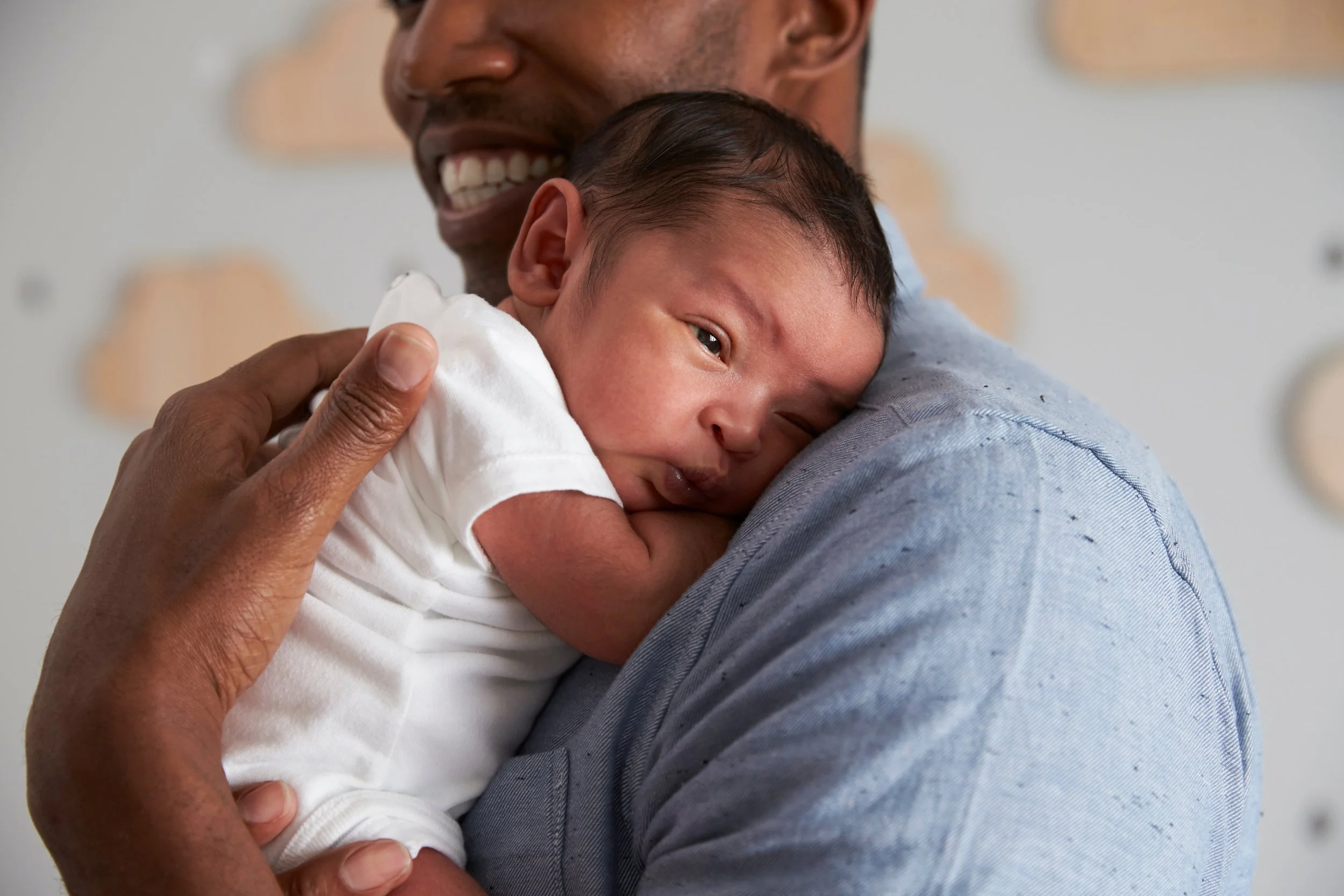Newborn sleep can be very exhausting because it's so unpredictable, especially if you're a first-time parent and you're used to being on a schedule. My goal with this post is to take some of the mystery out of newborn sleep, and although I can't promise a consistent schedule, I can promise you some great tips to make the scheduling part a little bit more manageable.
How to Get Your Newborn On a Good Schedule
By Kelly Murray
First Things First:
Some Things to Know About Newborn Sleep
I first want to talk a little bit about how newborn sleep works. That way, you can understand why you’re seeing all this wonkiness in the beginning!
1
Newborns do not have a fully-developed circadian rhythm
In case you’re unfamiliar with the term, a circadian rhythm is the timing of the ebb and flow of cortisol and melatonin in the body. Cortisol is the “alert” hormone that keeps us awake during the day, while melatonin is the “sleepy” hormone that allows us to feel tired at night. In adults, these hormones ebb and flow on a rather consistent basis over a 24-hour period. But for newborns, they have yet to develop this pattern. Instead, a newborn’s circadian rhythm is loosely tied to their mother’s. This brings me to my second point…
2
Newborns tend to go to bed very late
You have probably heard from friends or family members or read on blogs that babies should fall asleep somewhere around 7:00 PM. And while this is true for most little ones, it doesn’t hold up for young babies. Instead, newborns tend to gravitate towards a later bedtime, usually between 9:00-11:00 PM (more aligned with ours). Babies typically don’t start to fall asleep closer to 7:00 PM until they’re about four months old.
3
Newborn sleep is organized differently from ours
Adults sleep in about 90-minute cycles throughout the night and after each cycle, we experience a small intermittent wake-up before we fall back to sleep. Within each sleep cycle, we can go through as many as five different stages of sleep! However, for newborns, sleep is a bit more unpredictable and their sleep cycles aren’t very well-organized.
Newborn sleep is basically split 50/50 between REM sleep and deep sleep. REM sleep is the dreaming state when the brain is taking in all the information from the day and storing it into our long-term memory and discarding what’s not needed. Also, a process called neuroplasticity is taking place where new neural pathways are being formed to facilitate future learning. Newborns are learning so much every day, it makes sense that 50% of their sleep would consist of REM sleep. Consider this compared to adults, where REM sleep makes up just 25% of the sleep cycle breakdown. Another thing to know is that, unlike adults where our muscles go into a state of paralysis during REM sleep so that we can’t act out our dreams (for obvious safety reasons), newborns’ muscles aren’t paralyzed during REM sleep. So if you think that your newborn isn’t getting good quality sleep because it’s so restless, it’s actually a good sign because it means they’re just learning!
The other 50% of newborn sleep is deep sleep. This is when the body is doing the physical work of building muscle and tissue and the immune system is activated. 75% of growth hormone is released during deep sleep! Again, it makes sense why newborns spend so much time between these two stages of sleep, as they are doing so much time learning and growing. But with these two different stages, they are not yet in a standard cycle like we see with adults, where the cycles become more predictable.
4
Newborns typically don’t sleep for long stretches overnight
Newborn babies’ stomachs are super tiny and their bodies need a lot of calories to grow and develop. Also, milk is digested rather quickly, and therefore, newborns wake up approximately every 2-4 hours to eat. You really won’t expect to see those nice, long stretches of sleep until they’re closer to 8-12 weeks old.
Let’s Get to It:
Ways to Make Newborn Schedules More Manageable
Now that you know a little bit more about what to expect when it comes to newborn sleep, here are some ways you can make their (unpredictable) schedules a bit more manageable:
1
Keep your newborn’s wake windows nice and short
(45-60 minutes to start)
Newborns will remain on this wake window until they’re about six weeks old. (If you’re wondering what a wake window is, you must check out my blog post all about wake windows!) Instead of trying to put your baby on a clock schedule (which they won’t reach until they’re about 7-8 months), use age-appropriate wake windows to time naps and bedtime. The reason why is because you want to want to prevent your newborn from becoming overtired. If your baby becomes overtired, their body starts to produce cortisol (“alert” hormone!), which is counter-productive to sleep. So what happens then is your baby has a very hard time settling and staying asleep, and they become overtired, and that overtiredness will mount and grow throughout the day, so that what you’re left with at the end of the day is a very cranky baby. This is why we call that 5:00 PM time the “witching hour” because it’s when the overtiredness becomes unbearable for both baby and mom alike.
I know the wake windows seem really small, but trust me on this one. It is so important. The only thing you’re probably going to be able to do during the wake window is feed and change your baby, and then they’re going to go back to sleep. But the good news is that, once they grow and develop (with all that sleep!), they’ll be able to begin staying awake for longer stretches. Around six weeks is when they can consistently stay awake for a good 60-75 minutes, and by the time they’re three months old, they may stay awake up to 90 minutes if they’re taking nice, chunky naps.
2
Find Your Newborn’s natural bedtime
This is another thing you can do to help make your newborn’s schedule a little bit more predictable. Now, when I say “bedtime”, I don’t mean they’re going to fall asleep at 9:00 PM on the dot every night. Rather, it’s going to be about an hour range in which they fall asleep, and it’s going to be a bit later — somewhere between 9:00-11:00 PM. You want to time it so that it’s about 60 minutes after the last nap of the day, and your newborn should be napping about 5-6 times per day, so that can help give you an idea of where this lands. You will know you timed bedtime right because it will be when your baby sleeps for their longest stretch. If you put your baby down for what you think is bedtime and they wake up about an hour later, then you know that wasn’t bedtime. So, look for your baby’s natural pattern where they sleep for the longest amount of time overnight, and use that to help guide you.
3
Use Natural Light to Help YouR Baby Distinguish Daytime from Nighttime
Once you find a good natural bedtime, you want to aim to keep your baby in their crib for a good 11-12 hours overnight (outside of feeds, of course). Then, once it’s time to wake up for the day, turn on all the lights and give your newborn as much natural light exposure when they’re awake. This will help your newborn begin to distinguish daytime from nighttime, and start building their own circadian rhythm.
Newborns can sleep in a dark environment for naptime during the day — it’s totally OK, and I typically prefer that for the first few naps of the day, actually, since those are longer naps (and darkness assists with elongating naps). However, keeping your newborn in the dark for naps during the day isn’t totally necessary, as they can probably sleep just about anywhere.
Lastly:
You Are Not Alone!
I hope that these tips make you feel a little more empowered when it comes to figuring out your newborn’s schedule! If you still have a lot of questions and would like some support, we offer one-on-one newborn consultations and follow-up support. To learn more, you can schedule a complimentary 15-minute discovery call with us right here→
Special heads up: stay tuned because I am in the process of creating an on-demand newborn sleep program (just like my Murray Method for Babies program!) to be released later this summer 2022! If you’re interested in being one of the first to know about it, please send us your e-mail to info@kellymurraysleep.com and we’ll put you on our launch distribution list!
Sweet Dreams
Kelly Murray is a certified sleep coach and an award-winning pediatric sleep consultant based in Chicago offering sleep coaching services nationwide.









